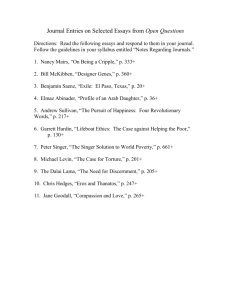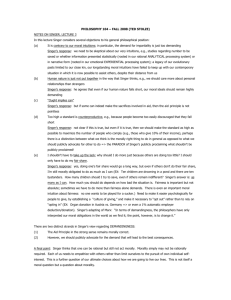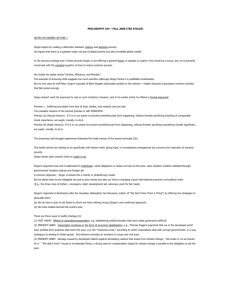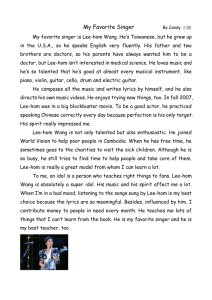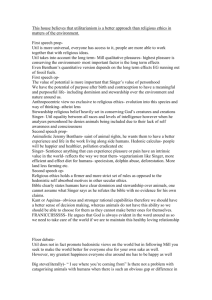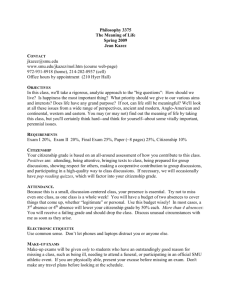Does Singer's “Famine, Affluence and Morality”
advertisement
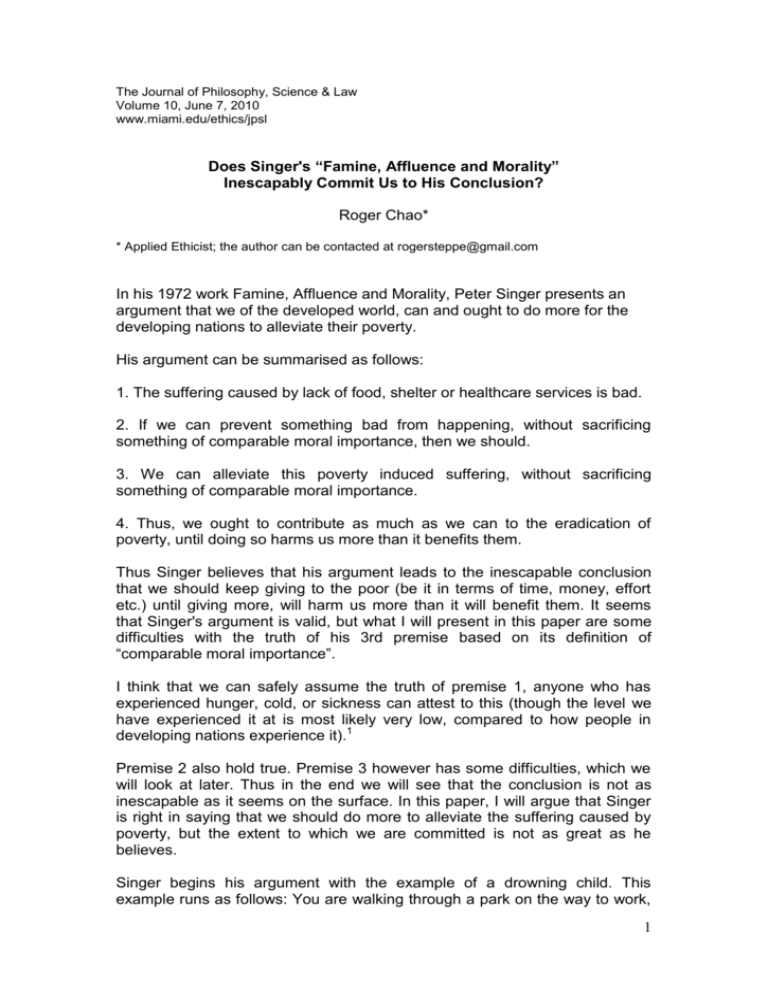
The Journal of Philosophy, Science & Law Volume 10, June 7, 2010 www.miami.edu/ethics/jpsl Does Singer's “Famine, Affluence and Morality” Inescapably Commit Us to His Conclusion? Roger Chao* * Applied Ethicist; the author can be contacted at rogersteppe@gmail.com In his 1972 work Famine, Affluence and Morality, Peter Singer presents an argument that we of the developed world, can and ought to do more for the developing nations to alleviate their poverty. His argument can be summarised as follows: 1. The suffering caused by lack of food, shelter or healthcare services is bad. 2. If we can prevent something bad from happening, without sacrificing something of comparable moral importance, then we should. 3. We can alleviate this poverty induced suffering, without sacrificing something of comparable moral importance. 4. Thus, we ought to contribute as much as we can to the eradication of poverty, until doing so harms us more than it benefits them. Thus Singer believes that his argument leads to the inescapable conclusion that we should keep giving to the poor (be it in terms of time, money, effort etc.) until giving more, will harm us more than it will benefit them. It seems that Singer's argument is valid, but what I will present in this paper are some difficulties with the truth of his 3rd premise based on its definition of “comparable moral importance”. I think that we can safely assume the truth of premise 1, anyone who has experienced hunger, cold, or sickness can attest to this (though the level we have experienced it at is most likely very low, compared to how people in developing nations experience it).1 Premise 2 also hold true. Premise 3 however has some difficulties, which we will look at later. Thus in the end we will see that the conclusion is not as inescapable as it seems on the surface. In this paper, I will argue that Singer is right in saying that we should do more to alleviate the suffering caused by poverty, but the extent to which we are committed is not as great as he believes. Singer begins his argument with the example of a drowning child. This example runs as follows: You are walking through a park on the way to work, 1 when you pass by a pond to see a small child struggling in the water. It would only take you 30 seconds to wade into the pond to save the child from drowning, but doing so will permanently damage your brand new leather shoes. Would you be wrong in ignoring the drowning child? Singer argues that in line with our intuitions, the minor inconvenience of getting your shoes wet is far outweighed by the saving of the child's life.2 Thus from this thought experiment, Singer attempts to show that where we can prevent suffering at little cost to ourselves we should, as to do otherwise would be wrong3. However, how far down this line of reasoning should we go? Singer claims that until the costs of us helping outweigh the benefits, we should go on helping; thus forcing us to keep on giving until we are reduced to the same level as the worst off - which seems too overly demanding. However, this conclusion that Singer draws, does not have to be the only way out. We start with a thought experiment A (the drowning child), from which we derive a moral intuition B (if we can help someone at minimal cost to ourselves we should), from which Singer derives his principle C (we should aid others until doing so makes us give up something of comparable moral importance). However by accepting B (that if we can help someone at minimal cost to ourselves we should), does not mean that we have to accept C (Singer's conclusion) as accepting B does not necessary entail accepting C, as it all depends upon your interpretation of “at minimal cost to ourselves”. Singer's conclusion is extremely counter-intuitive because of its over demandingness. We can see this if we expand upon what Singer's principle entails, it entails absolute equality (be it equality of welfare, or equality of resources or anything else), and that is why it is so counter-intuitive. Let us look at an example. $100 extra to a billionaire is nothing, maybe another bottle of wine, but $100 extra to a starving family in Africa is 6 months wages, enough to buy medicine so the children don't die – a $10 movie ticket to a wealthy doctor does not nearly provide preference satisfaction to the level that a $10 bag of rice, to prevent starvation to a whole family would. Thus in terms of decreasing marginal utility where our terms of reference are in famine/poverty, Singer's preference utilitarianism seems to require the overdemandingness of absolute equality. Let us now look at another example. If I am at a welfare level of 10 and a poor person is at a welfare level of 1, it is like me being a rich lawyer and the poor person a starving refugee. If I (the rich person) am going to spend money on a dinner, to Singer, I could do more good by giving this money to the poor person to buy a mosquito net (I give away one unit of welfare to the poor person, so now I have 9 units and the poor person has 2) since a luxury dinner is not worth as much as someone's life. Now if the next day I am going to buy a bottle of wine, I could according to Singer again do more good by giving this money to the poor person to buy some malaria injections (so now I have 8 units and the poor person 3) since my pleasure of drinking is of less significance than their health. 2 Again the next day, I am going to buy a movie ticket, but again according to Singer I realise it would do more good if I have this money to the poor person to buy oral rehydration powder (so now I have 7 units and the poor person has 4) since my seeing a movie, is not as beneficial as their grandmother not dying of diarrhoea. Thus according to Singer, this redistribution will keep going and going until we both reach the level of 5.5. Where for me to feed/immunise/house the other person better, I need to give up my own food/health/accommodation of similar value (since I can no longer afford wine, movies, or dinners etc., since I have given all this away already). Thus Singer's Principle requires that we keep giving and giving until we are at the same level as the worst off. This results in it being excessively overly demanding; as it means you cannot go to restaurants, see movies, buy wine or chocolates, go for holidays etc., but rather you must refrain from spending on luxuries and give your money to the poor. Thus Singer's principal does lead to this seemingly repugnant conclusion where we need to bring ourselves down to the level of the worst off. For us never to be allowed to spend time or money on treats or activities of interest to ourselves, or things to promote our own personal projects, or to have fun and promote the interests of those close to us; would result in us leading much less fulfilling lives - by alienating ourselves from the very things that give meaning to our own lives. Singer does actually formulate a more moderate principle “that we should prevent bad occurrences unless, to do so, we had to sacrifice something morally significant,”4 but to Singer this is purely for demonstration purposes of his argument, and not designed as a morally guiding principle. Singer himself says, “I should also say that the strong version seems to me to be the correct one. I proposed the more moderate version - that we should prevent bad occurrences unless, to do so, we had to sacrifice something morally significant - only in order to show that, even on this surely undeniable principle, a great change in our way of life is required.” Thus in line with Singer's argument, the more moderate formulation has to be rejected in favour of his strict formulation we outlined earlier, due to its arbitrariness. This more moderate principle however, is exactly in line with the “Pareto Efficient Capabilities Approach” I will outline later, and thus does not actually need to be rejected. Singer himself, tries to address this issue of over-demandingness in his 2009 book “The Life You Can Save”, however his way out is not to lesson our moral obligations from his conclusion in this earlier work, but rather to acknowledge how psychologically difficult it is to be this moral saint, by “suggesting a level [of charitable donation] that will get you started, and put you on a path toward challenging yourself and working toward doing more.”5 Thus it seems that Singer still admits the soundness of his original argument and that we are forced into its conclusion, but then goes on to pragmatically state that many people would not be able to do this, and thus suggests giving “5%” 6 of your income to charity as a form of appeasement. 3 This however just seems a bit of a cop out. He still admits that we are bound by his conclusion to contribute as much as we can to the eradication of poverty, until doing so harms us more than it benefits them, but that in the real world he tells people that a 5% donation is OK, because if he where to tell them to give more they wouldn't. Thus his reformulation is not very sound at all, and just looking for a way out of the over-demandingness objection albeit unsuccessfully, again due to its arbitrariness Thus we have seen how from the thought experiment A, we derive a moral intuition B, from which Singer derives his principle C. However even though we accept intuition B we can actually arrive at another principle D, (which I will attempt to explain later), which is different to Singer's, which actually leads to a different and more intuitively acceptable conception of justice. Thus just by accepting B, does not mean we are inescapably committed to C. From the drowning child example the moral intuition that if we can benefit someone at minimal cost to ourselves we should, seems pretty acceptable. However Singer takes it to its extreme in what it requires of us, when in fact there is a more moderate version we can take which leads not to an absolute egalitarian conception of justice, but rather one based on Pareto efficiency which I will call the “Pareto Efficient Capabilities Approach” (principle D). From moral intuition B, the principle we derive depends on our interpretation of “at minimal cost to ourselves”, Singer takes this to mean cost in terms of welfare. However, we can take this to mean cost in terms of capabilities instead. Singer's interpretation of cost in terms of resources lead to an extreme and unacceptable conclusion, however if we interpret cost in terms of capabilities/freedoms as well as using a conception of justice based on Pareto efficiency, we reach a much more acceptable conclusion. A conception of “cost” based on capabilities alone will still lead to the same conclusion that Singer purports, it is only when combined with the concept Pareto efficiency that we can actually arrive at a different and more acceptable conclusion. A distribution is Pareto efficient if and only if you cannot make someone better off without making someone else worse off. Now on a general level, this seems to look like we should not give any aid to the poor, as by making the poor better off, we are making the rich worse off. Pareto efficiency has nothing to say about marginal utility (it does not matter if the rich person's losses of 1 unit, results in a 1000 unit gain by the poor; we still encounter a loss, which is thus not Pareto efficient). Thus on a general level it seems that any amount of aid we redistribute to the poor from the rich is not Pareto efficient, as you need to take from somewhere before you can give it to someone! Thus if looking at Pareto efficient resource distribution as a means to aiding the poor, it seems we should do nothing! However, this is assuming Pareto efficiency is grounded in dollar terms or by a matter of degrees. There are however, other ways of quantifying Pareto efficiency. One approach might be to use a capabilities and freedoms approach, much like how Amartya Sen and Martha Nussbaum couch 4 development,7 an approach I will call the “Pareto Efficient Capabilities Approach”. To Sen, development is not about increasing GDP per capita, or wealth, but rather increasing the capabilities and freedoms of people. Sen defines these capabilities as, “the ability to meet one’s nutritional requirements, the wherewithal to be clothed and sheltered, the power to participate in the social life of the community.”8, as well as “a person's actual ability to do the different things that she values doing,”9 “shift[ing]...the focus of attention from the means of living to the actual opportunities a person has”.10 Thus based on this conception of capabilities, to a billionaire, losing $5 is not a loss in a capability. Nussbaum to defines these capabilities as consisting of, life, bodily health, bodily integrity, senses, imagination, and thought, emotions, practical reason, affiliation, and a few other factors, showing that it is not lack of money per se which creates poverty, but lack of these capabilities itself. Money is just the means to an end, the end being capabilities themselves. If we continue with this approach and use it in conjunction with Pareto optimisation, we can actually come to the conclusion that we are morally obliged to give aid, but not so much that it detrimentally impinges on our own capabilities and freedoms. In contrast to a continuous monetary measure of Pareto efficiency, a capabilities approach is discrete in nature, thus dealing away with any objections based on arbitrariness If a rich person gave away $5, this would not be Pareto efficient on a monetary measure of optimality, as they are losing $5. However, on a capabilities approach, this loss of $5 does not decrease any of the rich person’s capabilities. Giving away $5 a week wont cause you to starve (and thus lose a capability/freedom, such as freedom from hunger) but will rather mean that instead of putting $5 in the bank(or buying your 6 th cup of coffee for the day) you are giving it away. This $5 transfer will not result in any reduction of capabilities for the rich person, but will result in the increase of capabilities for a poor person (for example an anti-mosquito bed net resulting in freedom from preventable disease).11 Thus, in terms of capabilities, a transfer of $5 from the rich person to the poor is Pareto efficient, the poor person has increased the capabilities but the rich person has not reduced their capabilities. Thus, a Pareto efficient distribution in a capabilities approach can require us to give aid to the poor, but will not be nearly as demanding in committing us to give away as much as we can until we are as poor as they are. Let us look at another example of this. Imagine a scenario where you are going to the university bookshop to buy textbooks (essential for your education) and lollies (just a luxury for pleasure). As you are about to enter the shop a person collecting money for a charity approaches you. Having a think about how much benefit you would get out of the money (spent just on lollies) compared to that of a starving child in Darfur, you give the money to the charity worker. The next week you again go to the bookshop and the same charity worker approaches you, are you obliged to give them your money again instead of spending them on lollies? If so, then why not just give 5 the charity worker a big lump sum of money (enough so that you cannot afford to buy either textbooks or lollies) to save having to do this repeatedly every week? Now it seems here that Singer would have to be committed to this line of reasoning but this seems highly counter intuitive. Using the “Pareto Efficient Capabilities Approach” however, this problem is easily resolvable. By giving up your lolly money a few times, your capabilities are not lost (but the child's freedom from hunger) is gained, however by giving away all your possible spare money(that you would otherwise spend on university fees, textbooks, lollies etc.) your capability (freedom to education) is lost since you can no longer attend university.12 Thus, it seems that given a different conception of justice to Singer's absolute equality, we can end up with a duty to foreign aid, which does seem in line with our moral intuitions in terms of its demandingness, in regards to how far it alienates us from our own personal projects and those close to us. In the case of the drowning child, the wet shoes are not a loss of a capability, but the loss of the child’s life is (and thus even on the capabilities approach we should still save the child). Therefore, it seems that there is a way out of Singer's conclusion if we accept a different conception of justice based on a Pareto Efficient Capabilities Approach. Singer's argument then seems to rest on a much weaker principle (the one he himself rejects), namely that “if we can reduce suffering at minimal cost to ourselves, then we should” and not his originally stronger version “if we can reduce suffering, without losing anything of comparable moral significance, then we should”. Thus on this weaker principle it does commit us to helping/aiding the poor, but only up till a level where we lose a capability of our own, a reduction not in relative terms but rather absolute terms; and this second more acceptable variation is the principle that we are committed to, based on a Pareto Efficient Capabilities Approach. Singer rejects this approach due to its arbitrariness (as do I), but this arbitrariness does not occur within a Pareto Efficient Capabilities Approach framework. This difference as we have seen, depends on our interpretation of cost, Singer uses a cost benefit analysis of absolute welfare to determine cost (which we have seen leads to an unacceptable conclusion); whereas by using a capabilities/freedoms approach (combined with Pareto efficiency) to determine cost (where we are not obliged to sacrifice one of our own capabilities, no matter how much than can improve someone else’s) we reach a much more acceptable conclusion - a Pareto efficient conception of justice. Thus as we have seen, we are not committed to Singer's conclusion that “we should keep aiding the poor until doing so forces us to give up something of comparable moral significance”. As we are only committed in this regard if we use Singer’s definition of “comparable moral significance” alone. However, doing this leads us to an unacceptable account of absolute equality of welfare. This can be avoided if we use a different definition of “comparable moral significance” by using a Pareto Efficient Capabilities Approach. Thus we are not inescapably committed to Singer's conclusion. 6 References Nussbaum, Martha C., Women and Human Development: The Capabilities Approach, New York, Cambridge University Press, 2000. Nussbaum, Martha C., Sex & Social Justice, New York, Oxford University Press, 1999. Nussbaum, Martha, and Sen, Amartya, The Quality of Life, New York, Oxford University Press, 1993. Sen, Amartya K., Development as Freedom, Oxford, Oxford University Press, 2001. Sen, Amartya K., The Tanner Lecture on Human Values, Delivered at Stanford University, 1979. Sen, Amartya K., Idea of Justice, USA, Belknap Press of Harvard University Press, 2009. Singer, Peter, Famine, Affluence, and Morality, Philosophy and Public Affairs, 1(3): 229-243, 1972. Singer, Peter The Life You Can Save, New York, The Random House Publishing Group, 2009. Unger, Peter, Living High and Letting Die, Oxford, Oxford University Press, 1996. 1 Singer, Peter, Famine, Affluence, and Morality, 1972, p. 31. Unger, Peter, Living High and Letting Die 1996, p. 9. 3 Singer, Peter, Famine, Affluence, and Morality, 1972, p. 31. 4 Singer, Peter, Famine, Affluence, and Morality, 1972, p. 37. 5 Singer, Peter, The Life You Can Save, 2009, p. 8. 6 Ibid. 7 Sen, Amartya, Development as Freedom, 2001, p. 17. 8 Sen, Amartya, Equality of What, 1979 p. 24. 9 Sen, Amartya, The Idea of Justice, 2009, p. 253. 10 Ibid. 11 Nussbaum, Martha, and Sen, Amartya, The Quality of Life, 1993, p. 31. 12 Nussbaum, Martha, Sex and Social Justice, 1999, p. 42. 2 7
